
Responses edited for length and clarity
DLAR: In much of your work with the group, there’s a throughline of patriotism — this deep love for America, and also an appreciation for embracing otherness and uplifting the unheard. I’m curious about what your process is like as you go about creating a program that both loves America and also loves the people who are often overlooked or outright shunned in American society. What is the reconciliation like between those two things?
Responses edited for length and clarity
Alexander Lloyd Blake: That’s interesting. Loving America.
Or a version, a vision of America.
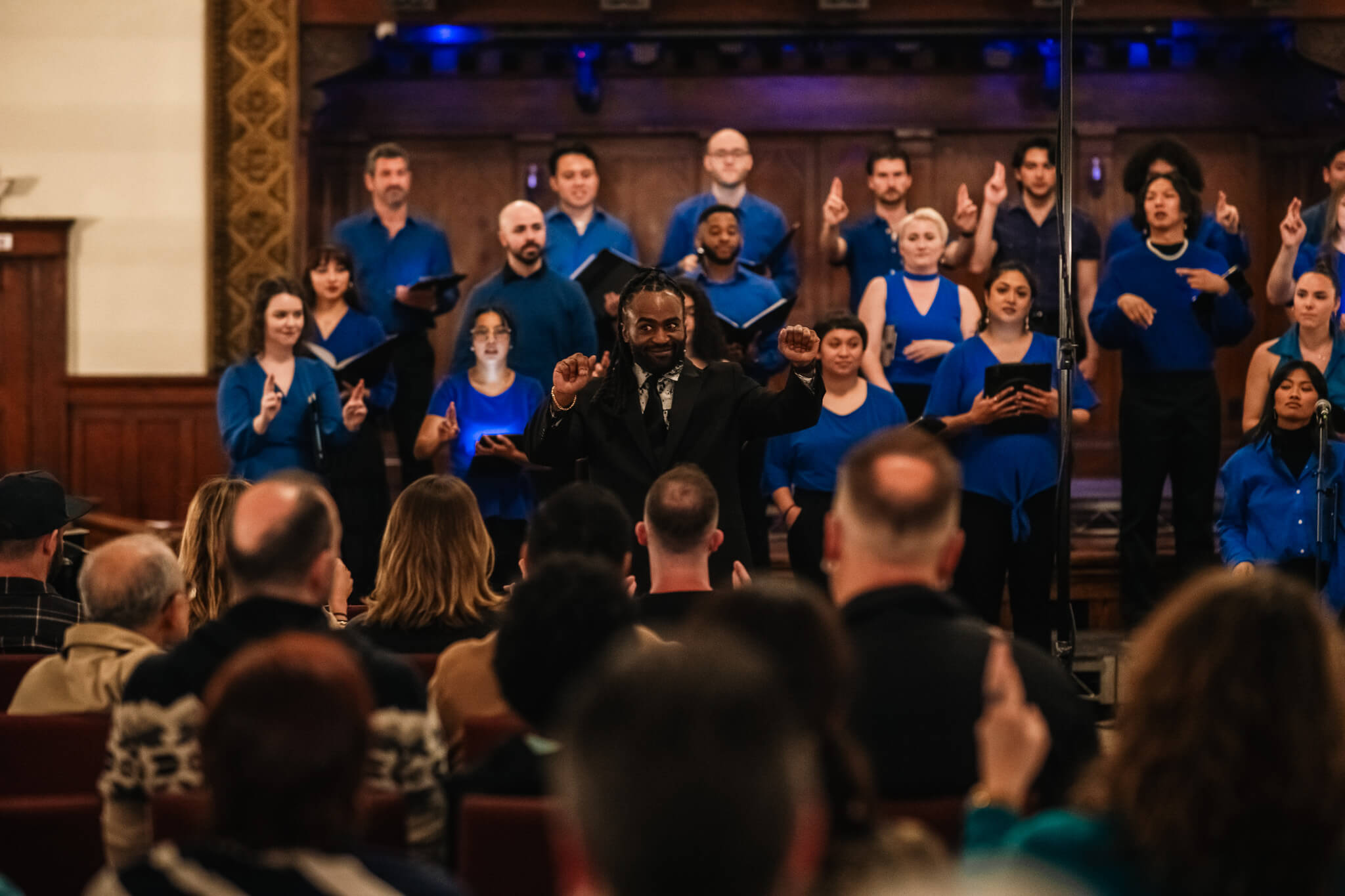
ALB: I love what America communicates they want to be. I always talk about this, like, “may God thy gold refine,” with an awareness that we are not where we want to be. And frankly, from day one of America, there is a history of stamping out otherness and taking advantage of. There’s a lot of work that we need to do to actually create The Land of the Free for all of us, for the people who were first here, for the people who were brought here, for the people who come here for some type of refuge.
I’m grateful for the opportunities that I’ve had as an American, but also there’s sense of “I didn’t choose to be here.” I think the pride that I have is for the ideals and for the history of people who have fought for this country to be an actual place of equality. What I think about our concerts being is a light, maybe a mirror to reflect.
The pride stems from doing the work. I imagine that can be hard to maintain in the face of some pretty horrific realities. What role do you think music plays in keeping the faith that America can better?
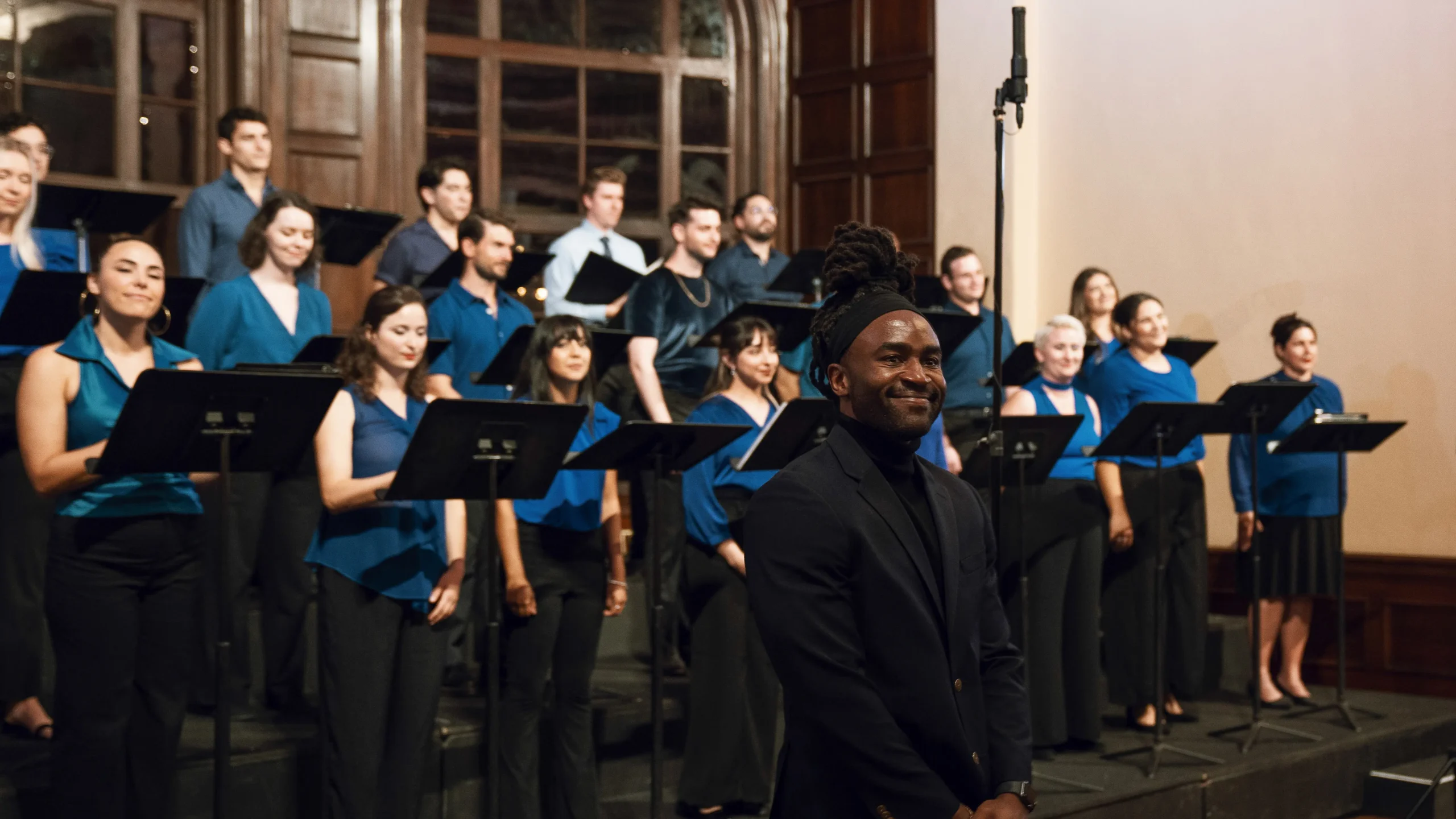
ALB: Music is used in almost every civil rights movement. Especially with choral singing, group singing, there’s a spirit that is created that I think allows people to find a strength and a connection. The act of singing and [making] music together allows people to feel bigger than themselves, and then allows people to have the confidence to move.
When you’re watching the news or reading about [these issues] in an article, it becomes distant from you emotionally. We get the statistics… I don’t think anyone is emotionally moved by math. I love math, but it’s not been moving me emotionally in the past. That doesn’t actually move people to act. And I think this is where music can help. This is where art can help in general.
With choral music, we have words, and in those words we can tell stories, and the music holds all this emotional connection that we have. If we can connect people to stories about humans, not just an issue, then this is a story about a person, right? A person. Then we’re not fighting about issues. We’re fighting about people. People who are hurt, people who are grieving, people who are mistreated. We start to create a solutions that affect our community.
One of Tonality’s programs this season is Home Care, which is focused on issues of climate change and urges people to become engaged in conversations about our planet, get active with local organizations. Unfortunately, the climate crisis is one of those issues that some people seem to simply tune out of because it may feel distant or irrelevant on an individual level. How do you deal with creating work about a topic that some audiences are reluctant to even acknowledge exists?
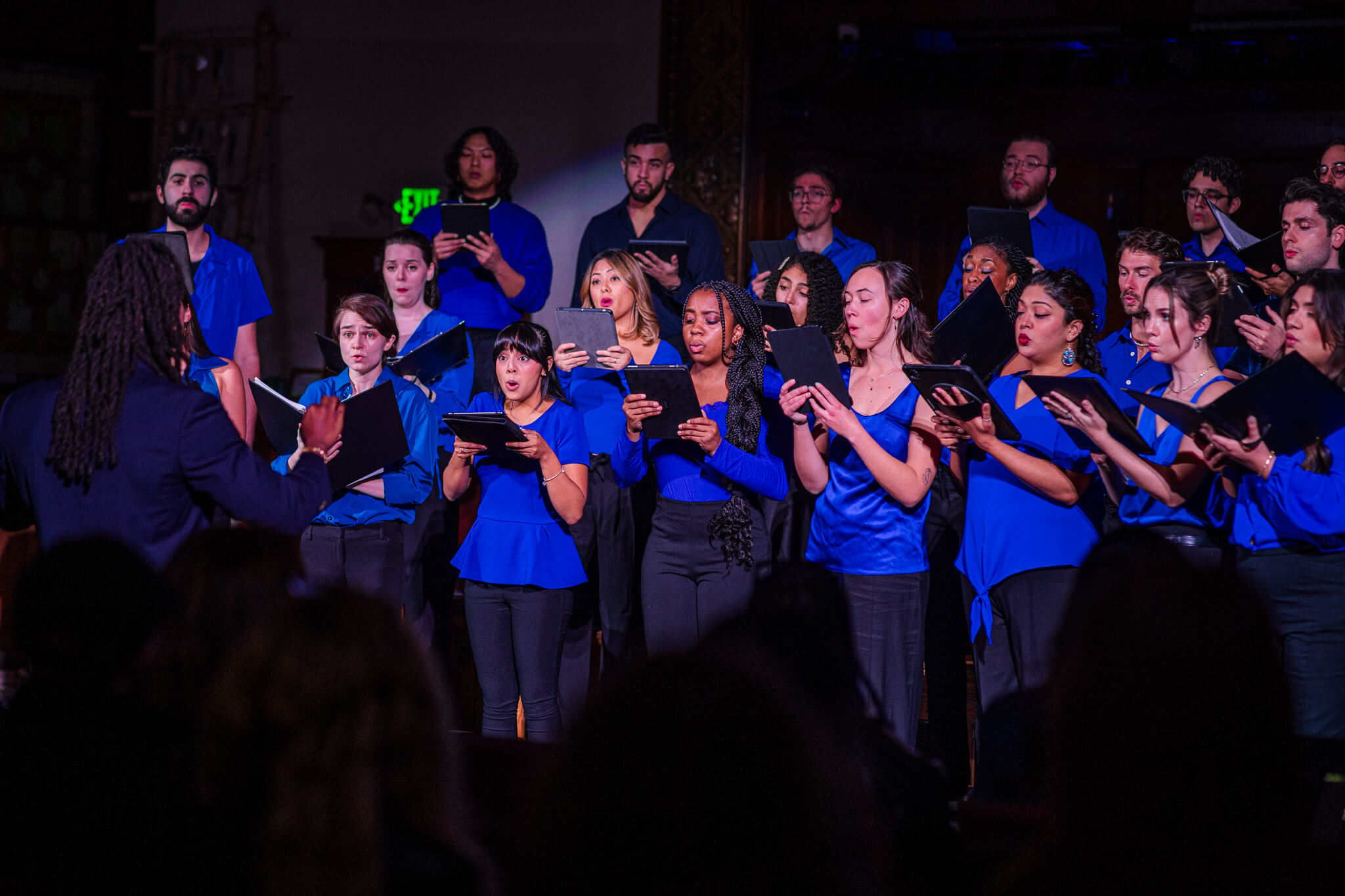
ALB: I always say that’s actually most of our concerts.
It is easier to just kind of live in a state of bliss or ignorance… it might seem a little less gloomy than the reality. But, if you’re tuning out, you’re not really seeing the solutions either. Part of this is just presenting some of those things.
With this concert, it’s the same thing of, like, “well, let’s talk about how the climate change has affected our communities.” I’m thinking of [California’s fires]. In some of these concerts, it can feel like you do a lot of work just within your personal environment, your personal situation. For climate change, there obviously is work one can do, but there’s a lot of work that we have to do collectively. You really do have to get involved in policy, because as much individual damage as we do on a day to life basis corporation and the way that we use resources on a national, global scale, that’s what’s actually going to cause the most damage, or that’s where we can make the most positive change.
Speaking of collective action, I wanted to ask you about the structure of Tonality as a choir. We know it’s not a typical choir, and I’ve heard you speak before about how classical music has been sometimes guilty of upholding the kind of prejudice and striation that your group tries very deliberately to upend. Considering the lateral structure of the group, that everybody gets a voice and a say in what is being sung, how did this structure come to be, and why is it important to the way that you create performances?
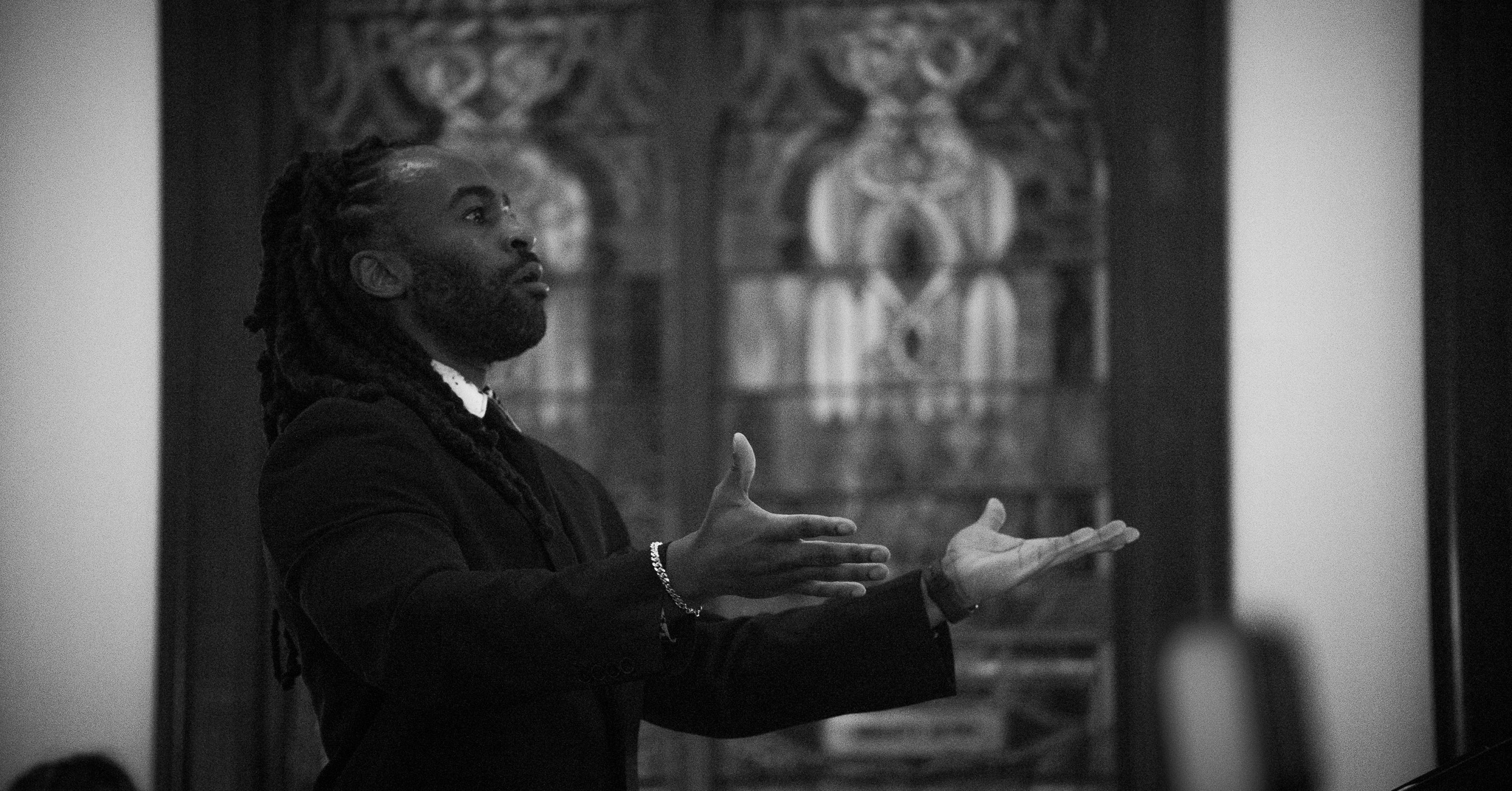
ALB: I guess I should clarify, we’re not so different. I do choose the music. I’ve asked certain people to help me choose music, so I would say it’s collaborative in that process.When we started to do these subject-specific concerts in the first season, I just chose subjects. And it was really interesting because everyone kept asking, “how is Tonality so timely?” All you have to do is open your eyes. We’re not choosing subjects to be timely. We are choosing conversations that are happening, and they just continue to happen until we fix them. But after the first year of that, I said, you know, “I’m not the only one that has my eyes and ears open.” The climate change concert actually came from us having a survey for the singers, and also in our audition process, asking singers, “what do you care about?”
And a lot of people kept bringing up climate change. The mental health concert was another one where I overheard singers [discussing the topic]. That has been one of the ways that we’ve been able to incorporate voices. In our concerts, we have singers tell stories. And to me, I think this is the transformational part of what Tonality does.
As we talked about earlier, the emotional aspect of the subject and the music is what I think activates audience members. People love to hear the music, but I think it’s the stories that actually help to bring people closer. And to me, there’s no better way to have that happen than for the singers to step out of their performance role. You know, for singers to step out of that role, and to then say: “this happened to me, this is happening to me, this happened to a family member.”
We were doing a piece for our gun violence concert, and we could not tune it. It just was not working. It was really annoying and frustrating. And then, one of the singers just decided to tell a story about her friend, who was murdered by [that] friend’s ex, and how the parents were crying over the casket. And we’re sitting talking about this, and then we go to sing that part of the song that we couldn’t tune. Since then, that was 2017, we have never had a problem with that piece. I was like, wow. As someone who can be very nuts and bolts about things, I realized the emotional connection that was created in the story did something to the group. The way we listened and the way we participated was enhanced. I saw firsthand immediately what happens when people can connect emotionally.
But when people ask me, “how do you talk about gun violence or women’s rights or abortion or trans rights or any of these issues? How are you able to do that?” We tell stories about people, and then we let empathy take its way.
Along the lines of an empathetic response, I’m thinking specifically of You Are Not Alone, which you’ve described as a “concert for the different,” from the perspectives of artists and individuals who are struggling with mental health challenges. There are a lot of kind of cheap associations made between artists and mental illness — it’s the Van Gogh effect — that “all the greatest artists are mentally ill.” This concert seems to reject that notion and instead focus on healing. What would you say to people who feel that artistic genius must be tied up in some kind of madness or insanity in order to be “good?”
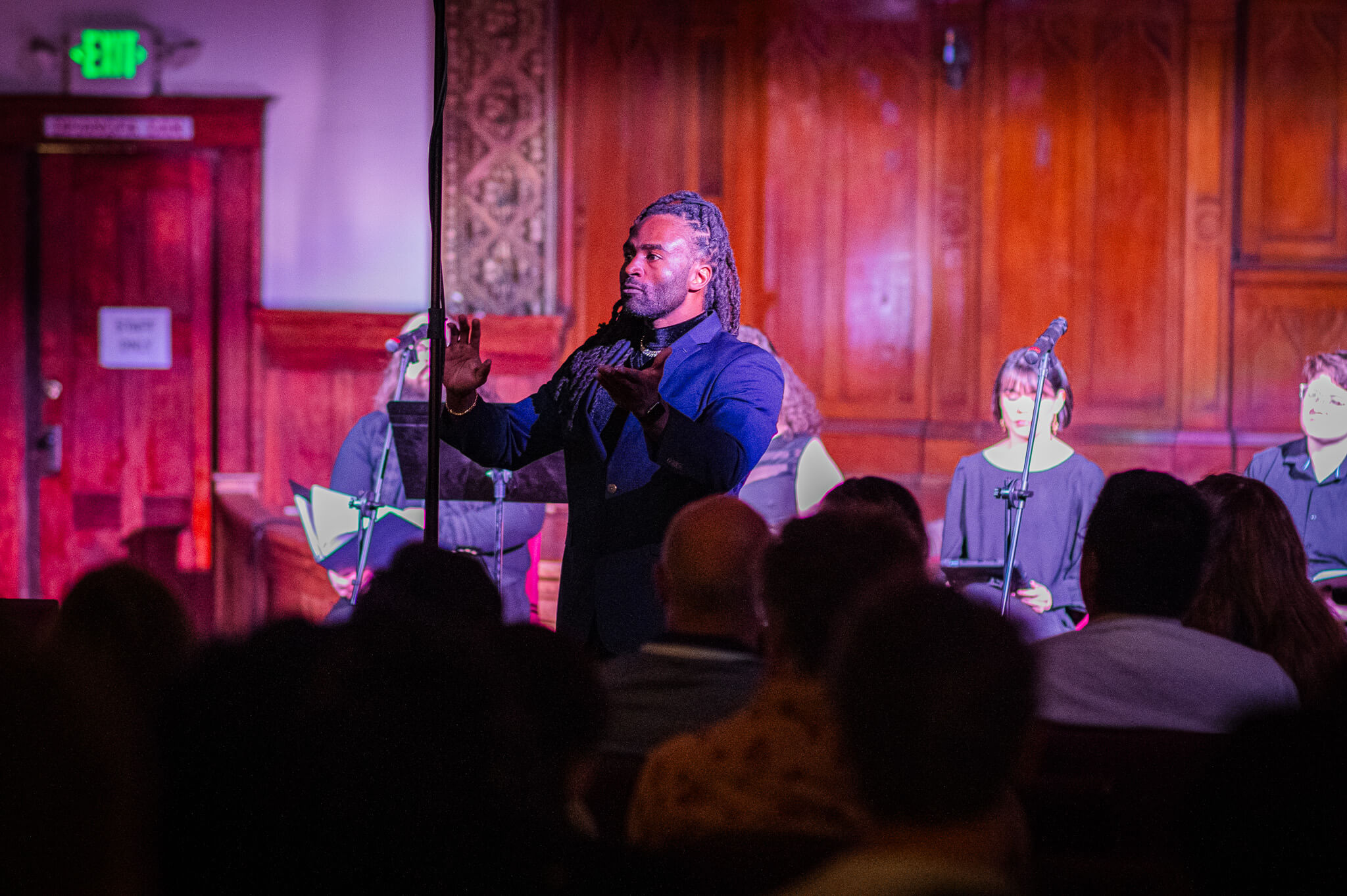
ALB: I think artists who are able to connect with a lot of people are able to be vulnerable. Some of these vulnerabilities lie in being able to speak on things that are stigmatized. Honestly, I feel like most of us live in variable states of mental unwellness. I don’t know if it is that people who are mentally unwell are able to create art, but sometimes people who are mentally unwell are also free of restraints. I’m not saying that, there’s, like, some badge of honor in that.
But, if you can live with being free and open and vulnerable and honest, I think that is a place where art can flourish. It can also flourish in people who are working toward healing, because there’s also beauty and process there as well. I actually probably said this in therapy — “if I was to fix a lot of my own issues, would that create a barrier for me?” My therapist kind of chuckled politely, and was like, “do you think if you become more healed and more capable of managing your mental health, that you will be less capable of doing art?” When you put it like that… it’s a funny question and easy answer.
In order to do art well, you have to release a lot and you have to be open to a lot of parts of ourselves that society doesn’t always like for us to talk about.